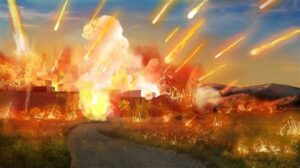The Destruction of Sodom and Gomorrah
18:1 to 19:38

Soon after the marvelous theophany and covenant described in Genesis 17, Abraham had another visit from the Lord. This, however, was not an appearance of the Lord in His glory, but rather was in the form of a man and his two friends traveling through Hebron in the heat of the day. The context of these two chapters makes it clear that the other two men were angels, who later were sent to Sodom and Gomorrah to bring God’s judgment on those wicked cities. The leader of the three men could have been none other than the Lord Himself and, therefore, Messiah in His preincarnate state (John 1:18).296
In general, the emphasis changes in this section from Elohim, the God of creation and destruction, to the Lord, or the preincarnate Yeshua Messiah. The only exception is in 19:29, where we are told that God destroyed the cities of the plain. It is appropriate that Elohim, the God of righteousness, be used there. But otherwise the Lord is used throughout these chapters. Therefore, the Lord chooses to focus on the mercy He gives to Lot, rather than the destruction of Sodom and Gomorrah.
The progression of these two chapters is written in typical Hebrew narrative style. At first, the writer describes what has happened from the author’s point of view. Then he proceeds to narrate how the person involved in the story made the discovery. For example, as in the case of Job, the author and the reader both know why Job was suffering, but Job does not. Through the narrative, however, he eventually learns.
This is the fifth of seven times that Avraham receives direct revelation from ADONAI (12:1-7, 13:14-17, 15:1-21, 17:1-21, here, 21:12-13 and 22:1-18).



Leave A Comment